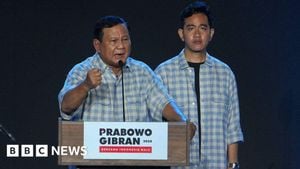China's interest and involvement in U.S. political affairs have been visibly heightened, especially as the 2024 presidential elections approach. From disinformation campaigns to legal entanglements involving Chinese nationals, the intricacies of this influence reveal much about China's broader geopolitical strategies.
Recent developments have highlighted the emergence of disinformation networks linked to China, particularly the infamous Spamouflage group. This organization is known for creating fake social media profiles aimed at mimicking American users, thereby subtly influencing political discourse online. Harlan, one such profile claiming to be a Trump-supporting Army veteran, was linked back to this group. Analysts at Graphika, a firm dedicated to tracking online networks, pointed out how these accounts are part of one of the world's most extensive covert online influence operations pushed by state actors. Jack Stubbs, Graphika’s chief intelligence officer, characterized this as a significant escalation, with China becoming more aggressive at infiltratin U.S. political conversations.
China's tactics reflect sophisticated messages embedded within broader discussions about key political issues, rather than outright support for specific candidates. Their strategies aim to undermine confidence not only in elections but also in the democratic processes themselves, focusing on topics like American policy toward Taiwan. This careful maneuvering highlights the long-term nature of their information campaigns, which analysts believe will persist well beyond Election Day.
The U.S. intelligence community has noted the involvement of other adversarial nations, including Russia and Iran, intensifying their online influence operations targeting American voter behavior. Experts have flagged Russia as the primary threat, but with China's nuanced approach to geopolitical influence, they are weaving complex narratives around divisive domestic issues—creating space for themselves within the fractured American political climate.
Meanwhile, the political climate within the U.S. is also seeing legislative battles such as the recent case where a 19-year-old Chinese student was arrested for attempting to vote illegally. This incident reflects the anxiety surrounding allegations of voter fraud tied to non-citizen participation, which has been exploited by various political factions.
This student, studying at the University of Michigan, was charged with acting as an unauthorized elector and perjury after misrepresenting his citizenship. This event intersects with broader campaigns asserting the need for stricter voter ID laws aimed largely at curtailing illegal voting. Michigan authorities pointed out the rarity of non-citizen voting but reaffirmed the stringent legal consequences attached to falsifying registration information.
These incidents highlight not only the challenges faced by Chinese nationals within the electoral system but also the politicization of voter registration processes within the broader narrative of election integrity. Such scenarios lend credence to the rhetoric pushed by those advocating for stricter voting regulations, which often disproportionately affect marginalized members of the community.
This complex interplay between domestic legislative actions and foreign influence demonstrates the larger stakes at play. It showcases how deeply entrenched narratives about election integrity can become weaponized, creating fertile ground for divisions within society even as external forces continue to manipulate public perception.
One political figure taking notice of these developments is Congressman John Moolenaar, who leads efforts focusing on China's role within U.S. political affairs. His recognition of the importance of such cases underlines a growing concern among lawmakers about foreign influence on voter behavior and the need for actionable frameworks to address these challenges accurately.
Overall, as the 2024 elections loom on the horizon, the strategies employed by adversarial nations like China reveal the shifting landscapes of both foreign and internal political dynamics. The growing complexity of interaction between domestic politics and international strategies offer insights on how elections could play out and what influence national narratives might take on moving forward. With the stakes of misinformation campaigns rapidly rising, both the voter base and those seeking office must navigate through these turbulent waters carefully.
What remains to be seen is how well American voters can discern the genuine from the manipulated as they head toward the polls, and whether strategies to inform the public can counter the pervasive threat of undetected influence operations.



